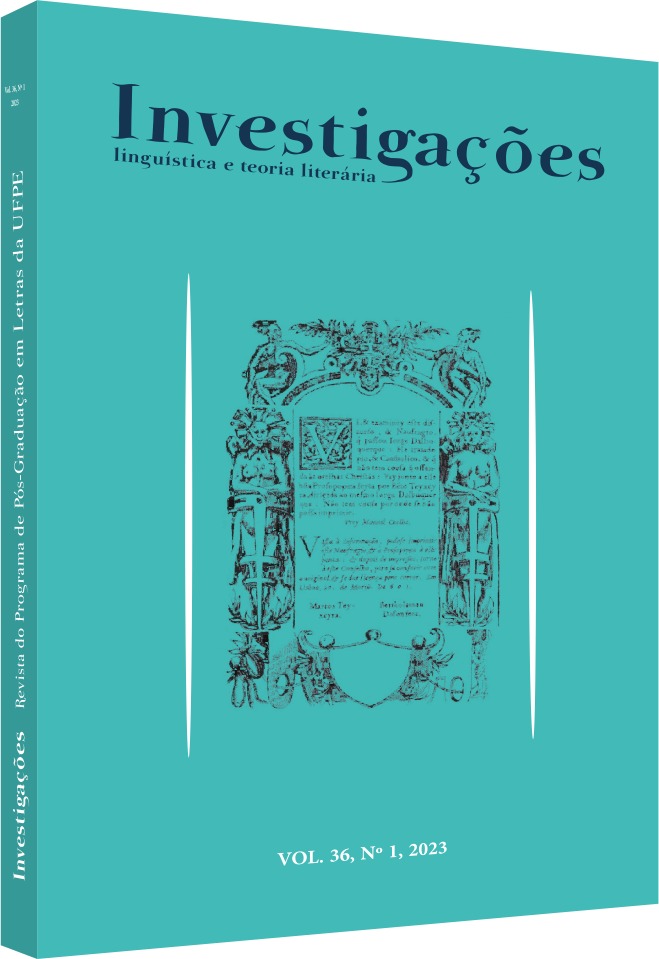Between faith and misfortune: the divine torment in Lúcio Cardoso and Dostoevsky
DOI:
https://doi.org/10.51359/2175-294x.2023.258402Keywords:
Lúcio Cardoso, Fyodor Dostoevsky, comparativism, faithAbstract
The aim of this work is to discuss the thematic points of relationship and dialogue between the poetics of Lúcio Cardoso and Fyodor Dostoiévski, listing, in a comparative perspective, the legacy of the Russian author as an influence on the Brazilian writer, in order to demonstrate not a relationship of dependency, but affinities. To carry out such an undertaking, the Cardosian critical fortune, was selected as a theoretical contribution for the research, more precisely the one that had focused on his relationship as a reader of Dostoevsky, such as Almeida (2009), Brandão (1998), Carelli (1988), Coelho (2013), Gomide (2011) and Nejar (2011).
References
ALMEIDA, Teresa de. Lúcio Cardoso e Julien Green: transgressão e culpa. São Paulo: EDUSP, 2009.
BRANDÃO, Ruth Silviano. Lúcio Cardoso: a travessia da escrita. Belo Horizonte: Editora UFMG, 1998.
CARDOSO, Lúcio. O viajante. Rio de Janeiro: José Olympio, 1973.
CARDOSO, Lúcio. Crônica da Casa Assassinada. Rio de Janeiro: Coleção Archivos, 1996.
CARDOSO, Lúcio. O Desconhecido e Mãos Vazias: Novelas. Rio de Janeiro: Civilização Brasileira, 2000.
CARDOSO, Lúcio. Inácio, O enfeitiçado e Balthazar. Rio de Janeiro: Civilização Brasileira, 2002.
CARDOSO, Lúcio. A luz no subsolo. Rio de Janeiro: Civilização Brasileira, 2003.
CARDOSO, Lúcio. Dias Perdidos. Rio de Janeiro: Civilização Brasileira, 2006.
CARDOSO, Lúcio. Diários. Rio de Janeiro: Civilização Brasileira, 2012a.
CARDOSO, Lúcio. Josué, o rápido. In: CARDOSO, Lúcio. Contos da Ilha e do Continente. Rio de Janeiro: Civilização Brasileira, 2012b. p. 132-138.
CARELLI, Mario. Corcel de fogo: vida e obra de Lúcio Cardoso (1912-1968). Rio de Janeiro: Guanabara, 1988.
CARPEAUX, Otto Maria. Os góticos e Le Fanu. In: CARPEAUX, Otto Maria. Ensaios Reunidos: 1946-1971. Rio de Janeiro: UniverCidade Editora, v.2, 2005. , p. 767-769.
COELHO, Nelly Novaes. Escritores brasileiros do século XX: um testamento crítico. Taubaté: LetraSelvagem, 2013.
DOSTOIÉVSKI, Fiódor. Memórias do Subsolo. Tradução: Boris Schnaiderman. São Paulo: Editora 34, 2000.
DOSTOIÉVSKI, Fiódor. O Idiota. Tradução: Paulo Bezerra. São Paulo: Editora 34, 2002.
DOSTOIÉVSKI, Fiódor. Os Demônios. Tradução: Paulo Bezerra. São Paulo: Editora 34, 2004.
DOSTOIÉVSKI, Fiódor. Os Irmãos Karamazov. Tradução: Paulo Bezerra. São Paulo: Editora 34, v.1, 2008a.
DOSTOIÉVSKI, Fiódor. Os Irmãos Karamazov. Tradução: Paulo Bezerra. São Paulo: Editora 34, v.2, 2008b.
DOSTOIÉVSKI, Fiódor. Crime e Castigo. Tradução: Paulo Bezerra. São Paulo: Editora 34, 2009.
DOSTOIÉVSKI, Fiódor. Duas narrativas fantásticas: A dócil e O sonho de um homem ridículo. Tradução: Vadim Nikitin. São Paulo: Editora 34, 2011.
GIRARD, René. Dostoiévski: do duplo à unidade. In: GIRARD, René. A crítica no subsolo. Rio de Janeiro: Paz e Terra, 2011. p. 51-166.
GOMIDE, Bruno Barreto. Da estepe à caatinga: o romance russo no Brasil (1887-1936). São Paulo: EDUSP, 2011.
NABOKOV, Vladimir. Fiódor Dostoiévski. In: NABOKOV, Vladimir. Lições de Literatura Russa. São Paulo: Três Estrelas, 2014. p. 140-187.
NEJAR, Carlos. História da Literatura Brasileira: da Carta de Caminha aos contemporâneos. São Paulo: Leya, 2011.
PONDÉ, Luiz Felipe. Crítica e Profecia: a filosofia da religião em Dostoiévski. São Paulo: Editora 34, 2003.
SANTOS, Hamilton dos. Lúcio Cardoso. São Paulo: Brasiliense, 1987.
Downloads
Published
How to Cite
Issue
Section
License
Copyright (c) 2023 Raphael Bessa Ferreira

This work is licensed under a Creative Commons Attribution 4.0 International License.
Authors who publish with Revista Investigações agree to the following terms:
Authors retain copyright and grant the journal right of first publication with the work simultaneously licensed under the Creative Commons Attribution 4.0 International (CC BY 4.0) license that allows others to share the work with an acknowledgement of the work's authorship and initial publication in this journal.
Authors are able to enter into separate, additional contractual arrangements for the non-exclusive distribution of the journal's published version of the work (e.g., post it to an institutional repository or publish it in a book), with an acknowledgement of its initial publication in this journal.
You are free to:
Share — copy and redistribute the material in any medium or format for any purpose, even commercially.
Adapt — remix, transform, and build upon the material for any purpose, even commercially.
The licensor cannot revoke these freedoms as long as you follow the license terms.
Under the following terms:
Attribution — You must give appropriate credit , provide a link to the license, and indicate if changes were made . You may do so in any reasonable manner, but not in any way that suggests the licensor endorses you or your use.
No additional restrictions — You may not apply legal terms or technological measures that legally restrict others from doing anything the license permits.

